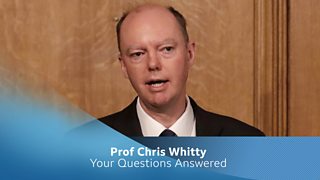Prof Whitty answers your coronavirus questions
Prof Chris Whitty believes it is possible to go back to life as it was before, with the lifting of restrictions expected to start in "months, not years".
But he says the UK is "not anywhere near" achieving herd immunity through vaccination.
England's chief medical officer has been answering audience questions about the pandemic in a special joint programme between ÃÛÑ¿´«Ã½ Radio 5 Live and the ÃÛÑ¿´«Ã½ News Channel.
You can listen back to the programme here.

Q: When can I go back to school?
Lilia, aged 12, in Greater Manchester said she knew people were staying at home to protect each other but wondered when she and her friends go could back to school?
"ÃÛÑ¿´«Ã½-learning has been really hard for lots of people," she said. "Not just because we can't see our teachers but because we can't see our friends as well."
Prof Chris Whitty thanked her and all students for staying at home and said he realised it was "very disruptive".
He said he hoped schools would reopen as the vaccination programmed moved down through the ages and the most vulnerable people were protected.
"What we hope is that opening up schools...can be done, and that may be in advance of quite a lot of things," he added.

Q: What is the plan for care homes?
Peter runs the Stratton Court care home in Cirencester. He asked what the plan was for care homes who are facing constant lockdown - particularly when the virus mutates.
"How long will this vaccine protect our residents?" he asked.
Prof Whitty said: "There will be some degree of mutation around the vaccine but much more slowly probably than flu.
"New vaccine technologies have been used for this, which makes it much quicker to actually turn them around."
He added that care home residents would be "top of the list" for vaccination against any mutations.

Q: When can my dad have his hip operation?
Karen in Manchester wanted to know when her dad's hip surgery could take place, as it had been cancelled many times.
Prof Whitty said while the NHS "is able to do all the emergencies it needs to do", routine operations were having to be put back because of the "enormous pressures" the health service is under.
He said he recognised the situation was very distressing for people, especially those in pain.
"What we wouldn’t want is anyone recovering from an elective hip operation, important but less urgent, to then catch Covid," he said.
Q: Are schools safe?
Jason is a parent and a school teacher from Rugby. He wanted to know if schools are safe.
Prof Whitty said the risk to children is low, but by mixing children together "they can bring households together", meaning a balance has to be struck.
"The real risk is not that it is risky to children or teachers, apart from particularly vulnerable people, but the real risk is the upward pressure on the R or transmission rate," he said.
"Because this new variant is so much more transmissible, we have had to include education in a way we have not previously had to do.”

Q: Can I go back to the front line after vaccination?
Joel, a surgeon in Middlesbrough, wanted to know if health workers could go back to the front line after vaccination.
Prof Whitty said people who are high-risk do need to consult with their doctor.
"Maybe for people who are really high-risk it is still sensible for them to be shielded and they should speak to their doctor about that," he said.
Q: Why are coffee shops open?
Prof Chris Whitty answered a question from Steve in Devon, who asked whether closing everything will encourage people to stay in.
Prof Whitty said he thinks ministers are trying to balance between minimising contacts and keeping society going "in a way which we have to do for many weeks".
He says: "What I would say to someone who is thinking of going to meet a friend in a coffee shop is really 'please don't'."
Asked about wearing masks when we leave the house, Prof Whitty says he would encourage people to wear a mask "and wear it properly over the nose and mouth" when indoors but says the risk outdoors is only in a crowded space.
"In an open street environment it probably makes little difference," he says.

